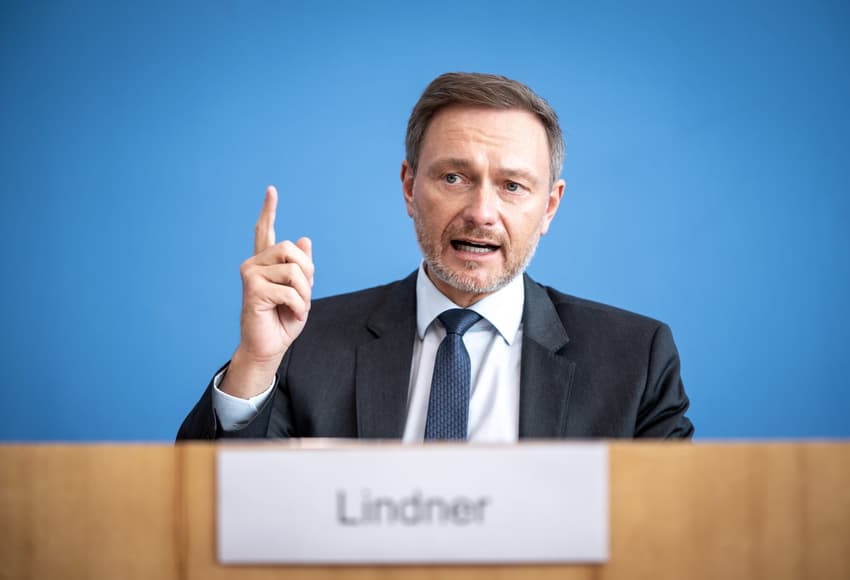Germany plans extra borrowing over war and energy crisis

The war in Ukraine and the fallout from soaring energy prices and sanctions against Russia will force Germany to take on more debt than expected this year, Finance Minister Christian Lindner said Wednesday.
After the government signed off on a "core" draft budget for 2022 that includes 99.7 billion euros ($110 billion) in new debt, Lindner said a supplementary budget was in the works that will take into account Russia's invasion of Ukraine and its economic consequences.
He declined to speculate how large the extra borrowing would be, saying the "uncertain times" made predictions difficult.
"With Russia's illegal attack on Ukraine, the world has changed once again and now we have to assume that we will also face additional burdens on the federal budget and additional expenditure," Lindner told a Berlin press conference.
After years of chasing balanced budgets, traditionally frugal Germany took on huge debt in 2020 and 2021 to help Europe's biggest economy cope with the coronavirus pandemic, lifting its constitutionally enshrined debt limits to do so.
Germany had hoped to scale down new borrowing in 2022 as it recovers from the coronavirus shock, but that was before the conflict in Ukraine shook the continent.
READ ALSO: German government announces fresh relief package for high energy costs
Aid, refugee support and help for German households
Talks are now ongoing among Germany's governing coalition parties - the Social Democrats, the Greens and Lindner's liberal FDP - about preparing a
supplementary budget "as soon as possible", Lindner said.
The focus will be on costs for humanitarian aid abroad, help for Ukrainian refugees arriving in Germany, and support for households and businesses as the war drives up energy costs and disrupts supply chains.
The government already unveiled a series measures earlier Wednesday aimed at cushioning the impact of sky-high heating bills and petrol prices, which have fuelled concerns about surging inflation in Europe.
Low-income households and students will be given a higher one-off heating allowance than previously envisioned, climbing to 350 euros for a two person household.
There will also be a boost to childcare benefits for poorer families.
To ease the financial burden on drivers facing record-high prices at the pump, Lindner said he was closely watching France's example of a petrol rebate and Sweden's move to temporarily cut fuel taxes.
Lindner said he still aimed to reinstate Germany's "debt brake" in 2023, with just 7.5 billion euros in new borrowing planned.
Comments (1)
See Also
After the government signed off on a "core" draft budget for 2022 that includes 99.7 billion euros ($110 billion) in new debt, Lindner said a supplementary budget was in the works that will take into account Russia's invasion of Ukraine and its economic consequences.
He declined to speculate how large the extra borrowing would be, saying the "uncertain times" made predictions difficult.
"With Russia's illegal attack on Ukraine, the world has changed once again and now we have to assume that we will also face additional burdens on the federal budget and additional expenditure," Lindner told a Berlin press conference.
After years of chasing balanced budgets, traditionally frugal Germany took on huge debt in 2020 and 2021 to help Europe's biggest economy cope with the coronavirus pandemic, lifting its constitutionally enshrined debt limits to do so.
Germany had hoped to scale down new borrowing in 2022 as it recovers from the coronavirus shock, but that was before the conflict in Ukraine shook the continent.
READ ALSO: German government announces fresh relief package for high energy costs
Aid, refugee support and help for German households
Talks are now ongoing among Germany's governing coalition parties - the Social Democrats, the Greens and Lindner's liberal FDP - about preparing a
supplementary budget "as soon as possible", Lindner said.
The focus will be on costs for humanitarian aid abroad, help for Ukrainian refugees arriving in Germany, and support for households and businesses as the war drives up energy costs and disrupts supply chains.
The government already unveiled a series measures earlier Wednesday aimed at cushioning the impact of sky-high heating bills and petrol prices, which have fuelled concerns about surging inflation in Europe.
Low-income households and students will be given a higher one-off heating allowance than previously envisioned, climbing to 350 euros for a two person household.
There will also be a boost to childcare benefits for poorer families.
To ease the financial burden on drivers facing record-high prices at the pump, Lindner said he was closely watching France's example of a petrol rebate and Sweden's move to temporarily cut fuel taxes.
Lindner said he still aimed to reinstate Germany's "debt brake" in 2023, with just 7.5 billion euros in new borrowing planned.
Join the conversation in our comments section below. Share your own views and experience and if you have a question or suggestion for our journalists then email us at [email protected].
Please keep comments civil, constructive and on topic – and make sure to read our terms of use before getting involved.
Please log in here to leave a comment.